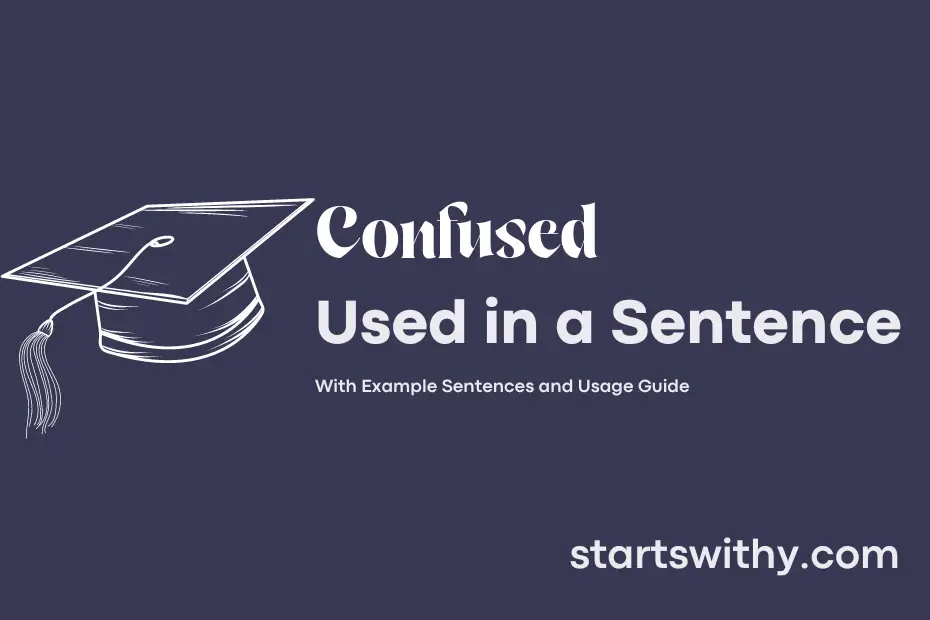Have you ever felt uncertain or puzzled about a situation, leading to a sense of confusion? Being confused means feeling a lack of clarity or understanding about something, causing you to be unsure of the right course of action.
Confusion can arise when information is conflicting or complex, creating a state of mental chaos where decisions become challenging. It’s common to feel bewildered at times, but finding clarity and seeking guidance can help navigate through moments of confusion.
7 Examples Of Confused Used In a Sentence For Kids
- The little boy looked confused when he couldn’t find his toy.
- The teacher helped the students who were confused with their math problem.
- The cat seemed confused when it saw its reflection in the mirror.
- My sister felt confused because she couldn’t decide which dress to wear.
- The puppy looked confused when it heard a loud noise outside.
- The baby bird seemed confused when it saw its mother fly away.
- The children were confused about where to line up for the school assembly.
14 Sentences with Confused Examples
- Confused about which elective to choose for the upcoming semester.
- Attended a seminar but left feeling more confused than before.
- Confused about the guidelines for the upcoming project submission.
- Feeling confused during exam preparation due to conflicting study materials.
- Confused about the new grading system introduced by the university.
- Received conflicting advice from professors and now feeling confused about the best approach to follow.
- Confused about the sudden change in the exam schedule.
- Feeling confused about the sudden increase in tuition fees.
- Confused about the format of the upcoming group presentation.
- Confused about the requirements for the internship application.
- Confused about the different career paths available after graduation.
- Feeling confused during a complex lecture on quantum physics.
- Confused by the multiple notifications from the college app.
- Confused about the sudden cancellation of a scheduled meeting with the academic advisor.
How To Use Confused in Sentences?
Confused
When using the word confused in a sentence, it is important to consider the context in which it is being used. The word confused is typically used to describe a feeling of uncertainty or lack of clarity. Here are some tips on how to effectively use confused in a sentence:
-
Subject/Object: Ensure that the subject of the sentence is the one who is experiencing the feeling of being confused. For example, “She felt confused by the complicated instructions.”
-
Verb: Use confused as a verb in a sentence to describe the action of feeling uncertain or puzzled. For example, “I was confused by the conflicting information.”
-
Adverb/Adjective: Use confused as an adverb or adjective to modify a verb or noun, respectively. For example, “She looked confused as she tried to find her way.”
-
Preposition: Pair confused with prepositions like “about,” “by,” “with,” or “as” to provide more context to the feeling of uncertainty. For example, “He was confused by the sudden change of plans.”
-
Connectors: Use confused in a sentence to showcase a contrast or comparison. For example, “While some were excited, others were confused by the announcement.”
Remember to use the word confused appropriately to convey the intended meaning clearly in your sentences.
Conclusion
In conclusion, sentences that convey confusion often result from a lack of clarity or understanding. These sentences may convey uncertainty, ambiguity, or a sense of being puzzled or perplexed. It is important to strive for clarity in communication to ensure that the intended message is effectively conveyed to the reader or listener.
Confused sentences can be clarified by carefully reviewing and revising them to improve coherence and consistency. By identifying and addressing areas of confusion, such as ambiguous language or conflicting ideas, the overall effectiveness of the communication can be greatly enhanced. Clarity in sentences is essential for effective communication and can help avoid misunderstandings or misinterpretations.



